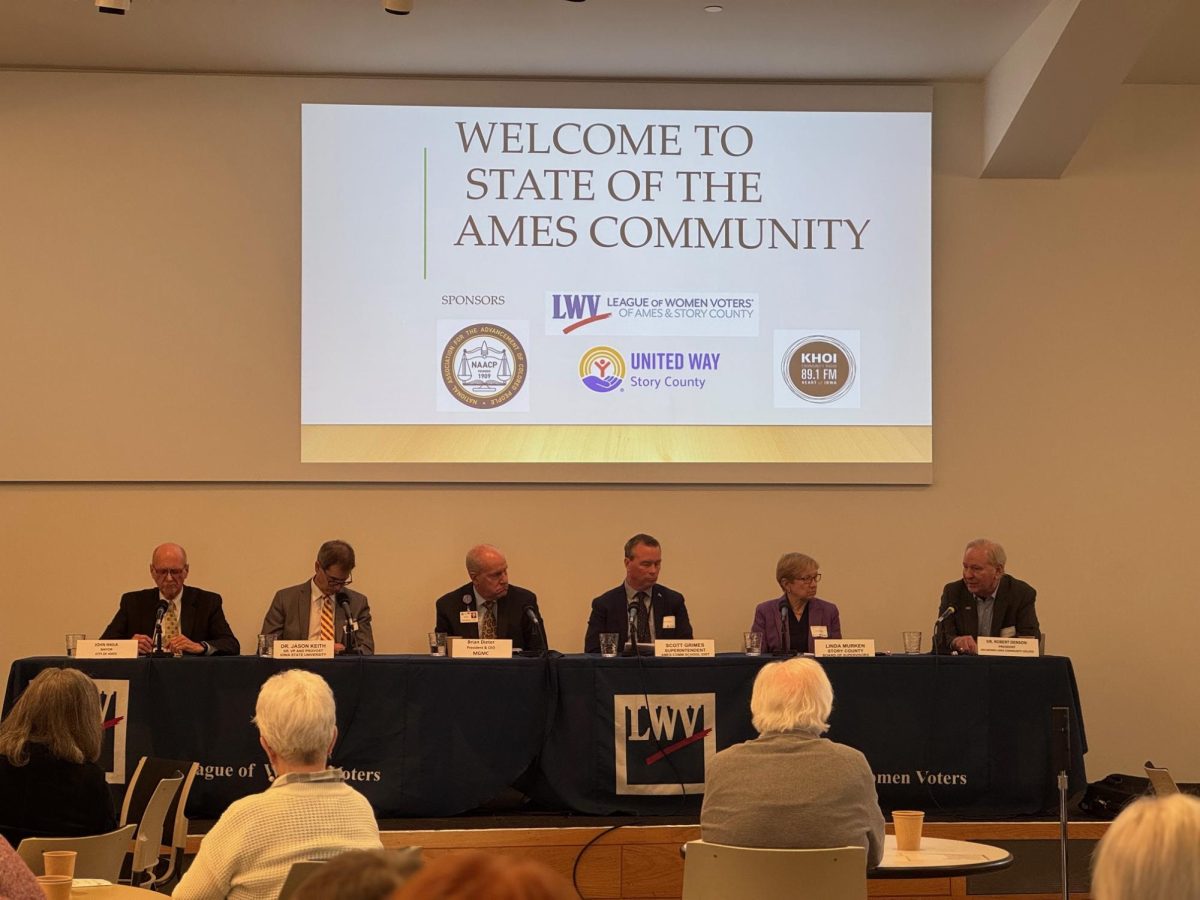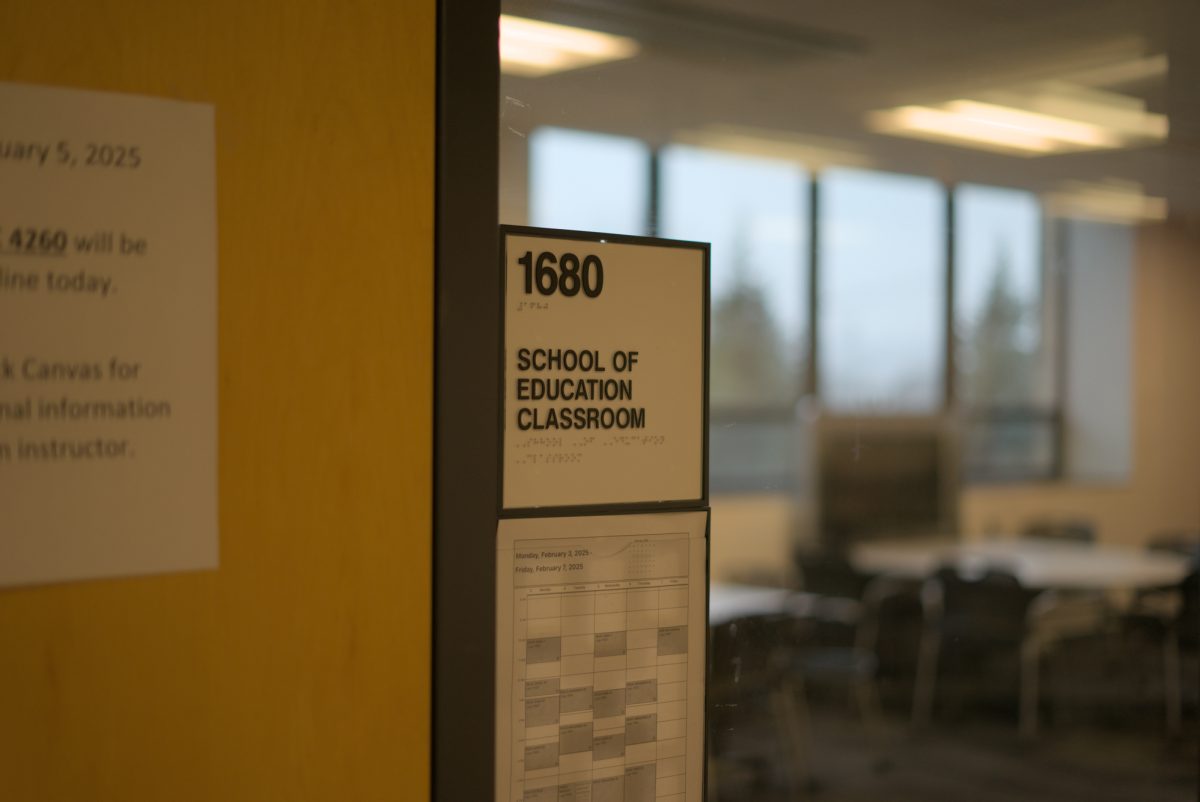Local leaders were allowed two minutes each to answer questions about the upcoming year, DEI and safety for immigrants and refugees at the 2025 State of the Ames Community, hosted by the League of Women Voters of Ames and Story County, the Ames NAACP branch and United Way.
The panel consisted of:
- Senior Vice President and Provost of Iowa State University Jason Keith
- President and CEO of Des Moines Area Community College (DMACC) Robert Denson
- Ames Mayor John Haila
- Superintendent of Ames Community School District Scott Grimes
- President and CEO of Mary Greeley Medical Center Brian Dieter
- Vice Chair of Story County Board of Supervisors Linda Murken
The moderator asked a set of questions, and the audience also had the opportunity to ask their own. Of the 11 questions received, seven of them related to DEI.
“Our audience is concerned,” said Linda Hagedorn, the moderator and a member of the organization’s board of directors. “There’s been closing of LGBTQ offices, DEI offices and officers at the universities and schools. They’re concerned that there may not be the same emphasis on the hiring of diverse staff and diverse workers in general, their fear that there may be a neglect of creating a diverse community.”
“How are you keeping [DEI] alive?”
Murken was the first to answer the question, stating there are no plans to disband the DEI committee, “I don’t know why we would.”
Denson was next to answer, focusing on individual student success, stating, “32% of [DMACC] students are diverse,”
“There’s no objection to helping students succeed as individuals,” Denson said. “We’re not targeting groups. We’re targeting individuals. They may be successful, so you may not hear us use the words, but you’re going to see us do the same actions.”
The next to answer was Haila, who mentioned a “label change,” but no change in the city’s DEI priorities in terms of “hiring practices… the Human Relations Commission.”
“It’s unfortunate we become more polarized around this issue,” Haila said. “I really feel for Iowa State University in particular, and some of the things that are coming down from legislature.”
Following Haila, the audience heard from Iowa State’s new provost, Keith.
“We need to be sure at the university that if there’s a student that appears to not feel welcome and we welcome them to an event, that’s what we’re committed to,” Keith said.
Keith did not say ‘diversity,’ ‘equity’ or ‘inclusion,’ but instead said it’s about “developing a relationship with a plan” to be successful with all students, staff and faculty.
On the panel, Dieter answered the question after Keith and addressed the audience directly.
“If you believe in DEI efforts, if you believe that equality for all are good and true and right and honest, then you must use your voice,” Dieter said. “Because there’s more power in the audience than there is up here at the table.”
Grimes echoed Dieter’s statement and emphasized doing what’s best for students and that “education for all means education for all.”
“I will remain committed to supporting our diverse population and ensuring an equitable education for all students, striving to make everyone feel included and valued within our system,” Grimes said.
“Talk about your organization’s policies or plans you may have regarding how members of our communities with immigrant or refugee statuses can feel safe and protected.”
The audience also asked the question, with four people mentioning the issue. Denson was the first to answer.
“This is a developing story as we know. Our team has agreed on what the law is and what we have to do,” Denson said. “We are not giving out any information other than directory information.”
Keith agreed with Denson’s statements and said Iowa State has “initiated some discussions at the institutional level” but is still in the early stages.
Haila said he wasn’t sure of any specific policies in terms of the city council, stating, “We don’t have any specific accounts, policies or plans relative to immigrants or refugees.”
Dieter mentioned a patient advisory committee so patients can provide feedback, but specifically said, “It’s the law that we will provide care to all.”
“I cannot image our country would change that [law] and say that we should discriminate,” Dieter said. “If that law and protection goes away, then we’ll have to go back to what I said in my last question: we’re going to have to do what’s right.”
Grimes was next to answer and mentioned that Ames schools have protections and policies in place for when strangers or law enforcement are in the building, as well as communication to families and staff, “reassuring that we do have things in place.”
“If our kids don’t feel safe, and our families don’t feel safe, we don’t have them to educate,” Grimes said.
Murken was the final respondent and thanked everyone on the panel for their attention to the issue.
“We tell children if you’re in a bad situation, look for the helpers,” Murken said. “Will law enforcement need to be looked at as the helpers? What are we doing to our society? What are we doing to these kids? If law enforcement, instead of being the helpers, the people you look to if there’s trouble, if they’re the people who are bringing trouble into your life.”
“How is your organization preparing for challenges or opportunities… and how does your organization work to balance your current and upcoming budgets?”
Keith was the first to speak and said it is becoming “quite clear” with the changing administrations that there will be a focus on “American productivity” and having a strong economy.
“This is something that Iowa State trains their students in every day, is preparedness for getting jobs that make a difference in the lives of citizens the world,” Keith said.
Dieter followed and spoke about focusing on what will or likely be, implemented.
“In particular, I’m focused on Governor Reynolds’ plans,” Dieter said. “She has to address both maternal, child and mental health with, in particular, increasing the number of residents that our state produces. When somebody completes medical school or residency in medical training in our state, they have a greater likelihood of staying in our state.”
Grimes said he plans to continue prioritizing mental health, family and community engagement, teaching and learning while understanding the upcoming “problem-tunities” that will come with legislation and federal government changes.
“I fully believe that our legislation, hopefully, is doing what’s best for Iowa,” Grimes said. “As a public education, I do feel like we’re being constricted, and we just need to find ways around the ‘problem-tunities’ that’s being provided to us from the federal level and state level.”
Murken mentioned problems currently being addressed, such as affordable housing, homelessness, broadband connectivity, food insecurity and climate change.
Denson said DMACC plans to be “optimistic that we’re going to be able to work through anything” and double down on their mission of student success despite unknowns at the state and local levels.
Haila also mentioned the struggle of not knowing what’s going to happen next. Specifically, he spoke about DOGE and the possibility of money cuts in the Ames community. Transit, in particular, relies heavily on federal funding.
“We get about over $2 million a year from the federal government to help pay for bus replacement and also facilities,” Haila said.“If they start trimming that back, we’re gonna have a reset on that.”














